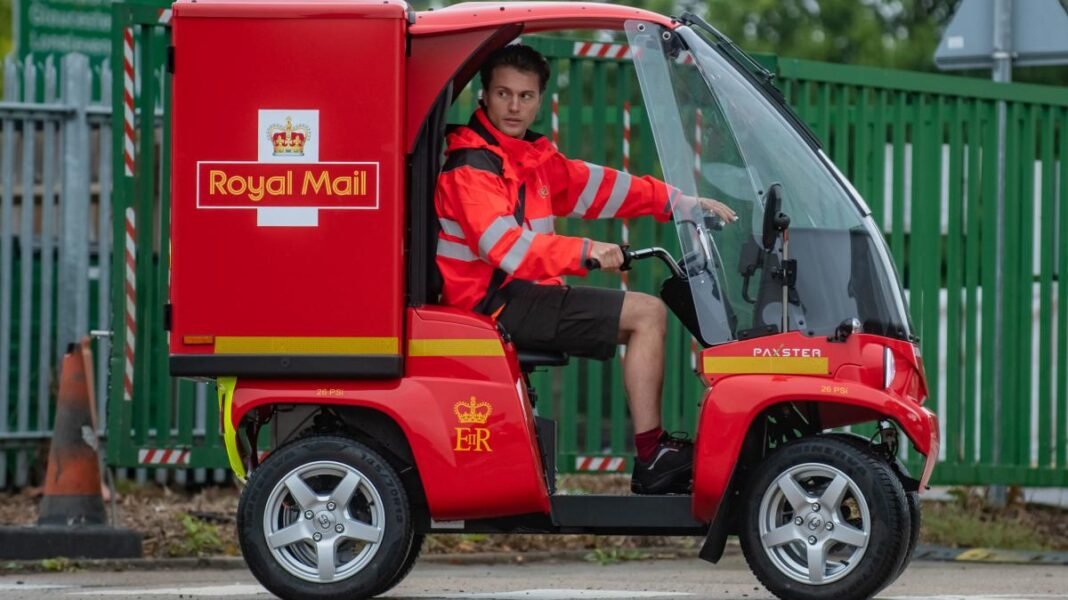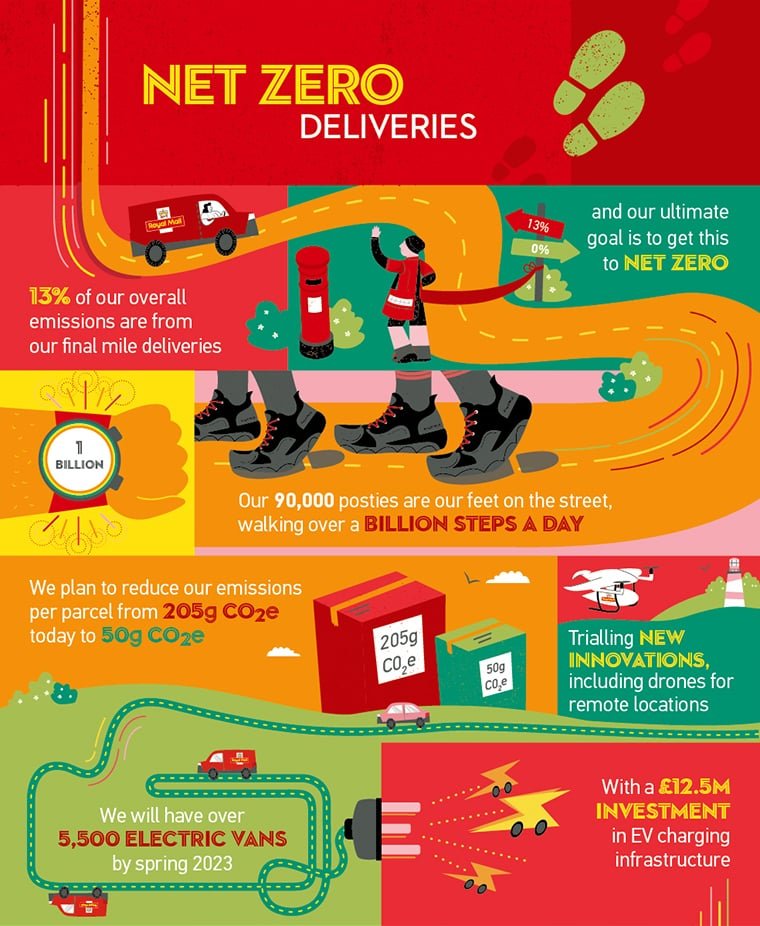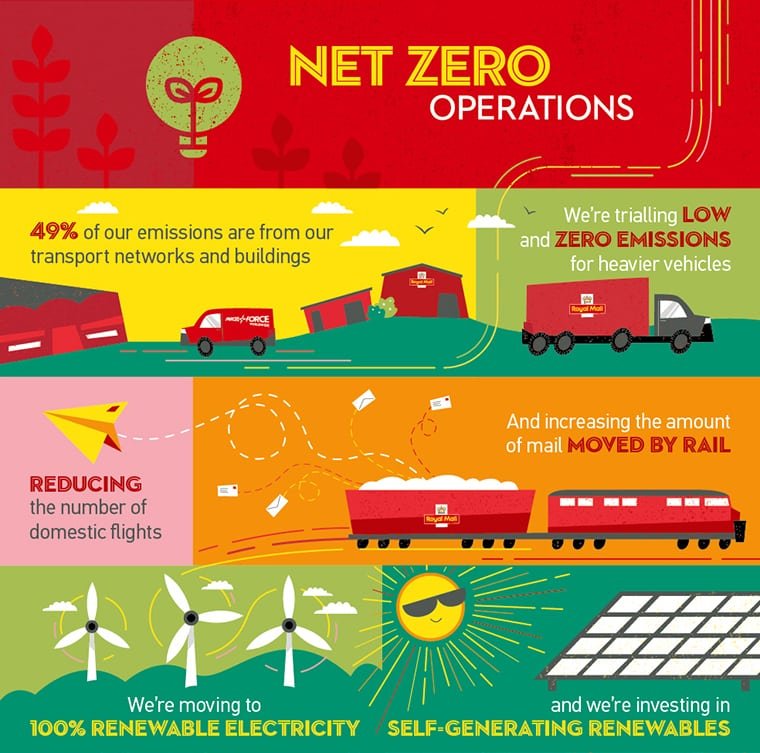The UK’s Royal Mail revealed an ambitious net zero carbon emissions target by 2040 through its new four-pillar ‘Steps to Zero’ plan.
The British postal service and courier company outlined its plans to reduce emissions from deliveries, operations, and the supply chain. In particular, its net zero plan includes a long-term goal to cut down its carbon emissions per parcel it delivers in the UK from 205gCO2e today to 50gCO2e.
The company’s 90,000 posties are walking over a billion steps daily to deliver parcels to 31 million addresses. These ‘feet on the street’ make the company a green option for delivering parcels.
Yet, its 4-pillar Steps to Zero plan goes further, embracing the urgency of tackling climate change.
Per Simon Thompson, Royal Mail’s CEO:
“A seven-day parcel service, to and from the customer’s door, delivered by a postie you trust and with the lowest emissions is the winning proposition.“
He also added that the environment is the next battleground for businesses. And setting an ambitious target to cut parcel emissions to 50 gCO2e shows the firm’s commitment to minimizing its impact on the environment.
Royal Mail’s Net Zero Emissions Plan
For 2020-21, Royal Mail posted a 5.8% increase in its total carbon footprint which is due to an increased volume of parcels. But it also posted a 6.9% reduction in carbon intensity when intensity is measured per £1m of revenues.
The company seeks to reach its net zero targets by 2040, 10 years earlier than the world’s goal by 2050. It pledged to reduce Scope 1 (direct) and 2 (power-related) emissions by 25% by 2025/26.
At the same time, its target for Scope 3 emissions is a 25% reduction between 2020/21 and 2030.
Such targets are in line with 1.5C from the Science Based Targets initiative (SBTi).
The “Steps to Zero”
Royal Mail’s net zero emissions plan is a four-pillar strategy to address the climate crisis; each pillar consists of specific net zero emissions targets.
Here are the four pillars and their corresponding targets and measures.
1. Net Zero deliveries: fleet electrification
13% of Royal Mail’s total emissions are from final mile deliveries. And so the firm seeks to reduce this to zero by:
- Growing electric vans (EVs) to 5,500 by Spring 2023
- Investing £12.5m in charging infrastructure across the country in 2022/23
- Trying new innovations like drones for remote locations
2. Net Zero operations: 100% renewable electricity
49% of Royal Mail’s emissions are from domestic operations, including transport networks and buildings. Measures to reduce them include:
- Moving to 100% renewable electricity across the business from 2022
- Reducing the number of domestic flights
- Increasing the use of rail
- Investing in self-generating renewables
Royal Mail’s largest solar panel installation will go live at the new Midlands Parcel Hub in 2023.
3. Making circular happen: circularity via reuse and reduce
Royal Mail’s 3rd pillar for net zero emissions involves transforming its operations and behaviors toward circularity.
In particular, it will apply reuse models and reduce single-use items, targeting to achieve:
- 25% reduction in waste by 2030
- Increase recycled content of plastic delivery bags
- Elimination of cable ties in mail bags
- Help customers embrace their own circular journey via its Parcel Collect service
4. Collaborating for action: drive net zero in the industry
The final pillar of Royal Mail’s ‘Steps to Zero’ plan is all about collaboration with other businesses across the UK’s postal system to standardize reporting on CO2e per parcel. This is to help customers make an informed decision about their delivery/courier needs.
Also under this pillar, Royal Mail emphasized its intention to collaborate with other fleet operators to speed up the decarbonization of transport via rolling out of EVs and low emission vehicles.
The company will also look at all commercial vehicles and new fuel types not just electric.
Royal Mail is a member of The Climate Group’s EV100 initiative. The group sought to make EVs “the new normal” by 2030.
According to Royal Mail’s CEO, pulling forward its net zero emissions target by 10 years to 2040 means the company has to:
“… transform the way we collect, process, and deliver the 10 billion letters and parcels we handle each year.”
The company will report its ‘Steps to Zero’ progress annually and later in June through its ESG report.



